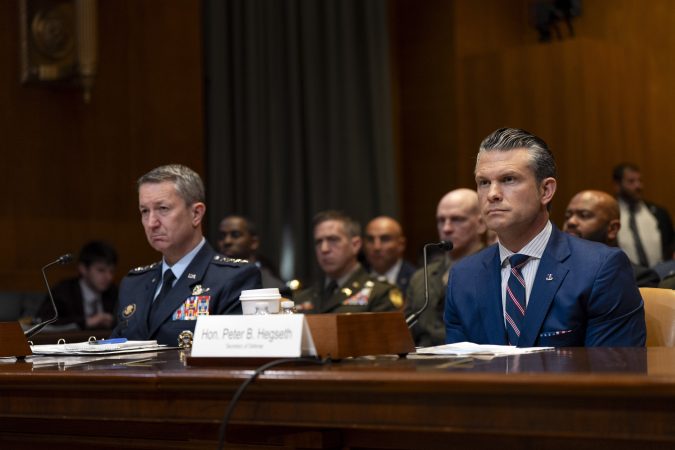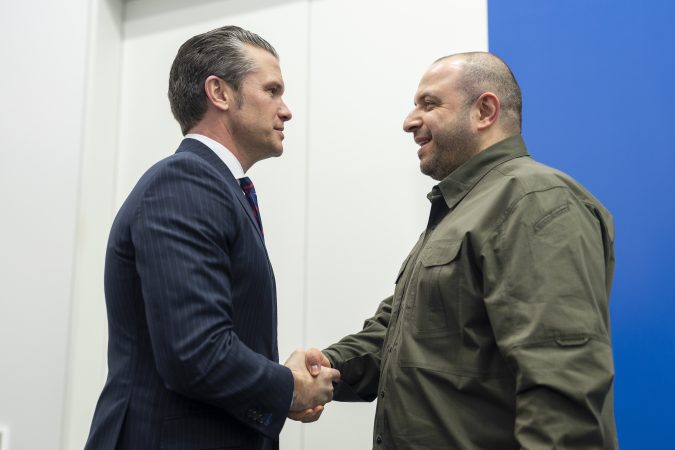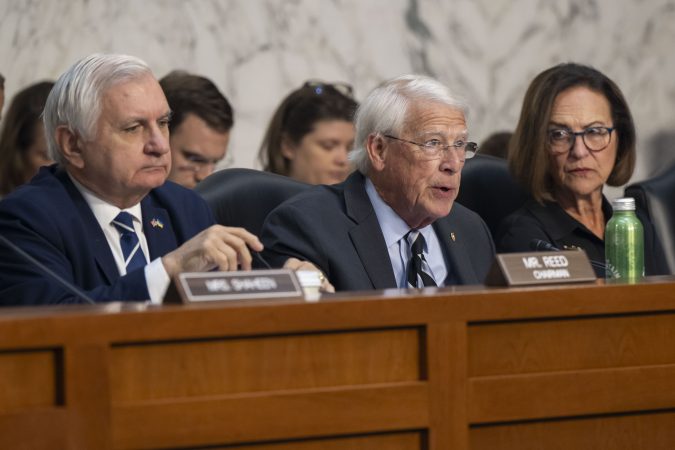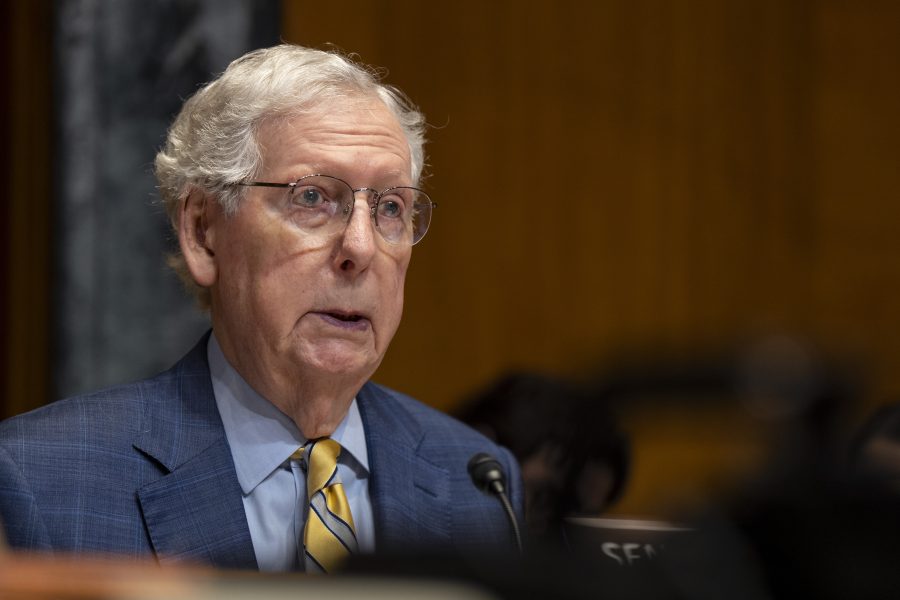Efforts to craft the Pentagon’s next budget have highlighted disagreement among Republicans on whether the U.S. should continue to support Ukraine in its three-year war with Russia, pitting some key GOP defense hawks against the Trump administration on questions of military aid and larger concerns about America’s role on the world stage.
Republican support for Ukraine has been a steady refrain as lawmakers consider the Pentagon’s $832 billion base spending request for 2026—which the department hasn’t yet made public—and a rare point of contention on defense between the GOP-controlled legislature and White House.
The standoff came into view at a Senate defense appropriations hearing where, in the absence of budget details, senators urged Defense Secretary Pete Hegseth not to let Ukraine fall into Russian hands.
Subcommittee Chairman Mitch McConnell (R-Ky.), a vocal critic of Moscow, opened the hearing by asking the secretary which country is the aggressor and which is the victim. Russia is the aggressor, Hegseth answered.
“Which side do you want to win?” asked the former Senate majority leader.
“This president is committed to peace in that conflict,” Hegseth said. “Ultimately peace serves our national interests and, we think, the interests of both parties, even if that outcome will not be preferable to many in this room and many in our country.”

McConnell continued: “Which side is [Chinese President Xi Jinping] pulling for?”
“Under the previous administration and the policies they’ve pursued, it has driven Russia and China closer together,” Hegseth said. “There’s no doubt that China would prefer that Vladimir Putin have a good outcome. But it would also prefer a prolonged conflict that would keep us and other countries tied down and incapable of paying attention to the malign influence of China elsewhere.”
Hegseth argued that Democratic administrations emboldened Russia’s gradual invasion of Ukraine starting in 2014, and that Putin’s respect for President Donald Trump will help lead to a peace agreement.
“A negotiated peace in Ukraine makes America look strong, makes us look like we understand the state of the world and where we want to be focused, even if we understand that Russia’s the aggressor and we applaud the efforts of the Ukrainians,” Hegseth said. “There is a moment where you have to recognize what exists on the battlefield and that a better outcome is a negotiated peace to stop the killing. … Our budget reflects that perspective.”
McConnell countered that the Russians don’t seem interested in negotiating, and the U.S. is risking its reputation by withdrawing support. “Will we defend democratic allies against authoritarian aggressors?” he asked.
No answer followed.

Trump promised as a candidate that he would end the Russia-Ukraine war within 24 hours of taking office, but diplomatic efforts have not progressed, and he has since suggested the war might have to drag on. Meanwhile, he has not indicated an appetite to continue financial support for Ukraine.
Ukrainian President Volodymyr Zelenskyy’s February visit to the White House ended abruptly after he, Trump, and Vice President J.D. Vance found themselves in a heated argument in the Oval Office during a press availability. Trump halted military aid shipments days later.
Two rounds of peace talks between Russia and Ukraine have failed to produce a ceasefire, leading Trump to compare the two countries to children.
“Sometimes you’re better off letting them fight for a while and then pulling them apart,” Trump said during a June 5 meeting with German Chancellor Friedrich Merz in the Oval Office.
Earlier this month, Hegseth skipped the latest gathering of the Ukraine Defense Contact Group, representing more than 50 nations providing military support. It was the first such meeting not attended by a U.S. defense secretary, who typically chairs the sessions.
Trump has gone back and forth on how to get Putin to the table, alternately encouraging the Russian leader and considering sanctions. Meanwhile, the Russian and Ukrainian militaries continue the fight that one recent assessment found has killed nearly 1.4 million people so far.
At the June 11 appropriations hearing, Sen. Lindsey Graham (R-S.C.), a close Trump ally and defense hawk who is leading a Russia-sanctions bill, urged the administration to pressure China and India to stop funding the war by threatening to lock those countries out of American markets if they won’t stop buying Russian oil.
Graham asked Chairman of the Joint Chiefs Gen. Dan Caine if he thought Putin is going to stop if he wins in Ukraine.
“I don’t believe he is, sir,” Caine answered.
Hegseth added: “Remains to be seen.”
“Well, [Putin] says he’s not,” Graham said. “This is the ’30s all over again. It doesn’t remain to be seen. He tells everybody around what he wants to do.”
“We gotta get this stuff right,” he continued. “Russia will dismember Ukraine and keep going if we don’t stop them.”
The House and Senate armed services committees will also have chances to press Hegseth on Ukraine policy this month. At a hearing on the Air Force’s 2026 budget request last week, Rep. Joe Wilson (R-S.C.) referred to the Russian president as “war criminal Putin” and Ukrainians as “courageous patriots.”
Lawmakers could add pro-Ukraine provisions to the defense spending and policy bills but would ultimately need Trump’s approval to enact them.
The House Appropriations Committee’s draft defense spending bill does not include funding for Ukraine aid, nor does the sweeping tax-and-spending package known as the “One Big, Beautiful Bill.” Congress can pass that bill without Democratic votes through the budget reconciliation process, which lowers the vote threshold for approval.
The Pentagon’s base budget request also eliminates funding for the Ukraine Security Assistance Initiative, Democrats said. Hegseth told House appropriators on June 10 the administration would seek “a reduction” in spending on Ukraine.
“I don’t think the word ‘victory’ has been well defined, or the path to it,” Hegseth said when asked about the decision to slash Ukraine aid.
The U.S. has approved $67 billion in military assistance to Ukraine since Russia’s unprovoked invasion on Feb. 24, 2022. The Pentagon is still delivering military equipment authorized in the final four rounds of aid approved under presidential drawdown authority by the Biden administration, Hegseth said June 10.
In a joint statement on Putin’s rejection of a ceasefire in March, the chairmen of the House and Senate armed services panels applauded Trump’s effort to broker a peace deal but said Ukraine must continue to receive intelligence and military assets from the U.S. and NATO.

Sen. Roger Wicker (R-Miss.), chairman of the Senate Armed Services Committee, typically wears a Ukrainian flag pin affixed to his lapel. He said his display of support was initially very popular, but more recently has drawn criticism. It’s an outward sign of his continued belief that the U.S. needs to be steadfast in its support of Ukraine.
Wicker told reporters at a June 4 Defense Writers Group event he hopes U.S. negotiators now realize that Ukrainians intend to defend their homeland and need support as a smaller country with fewer resources to fight back.
Recent conversations with U.S. and Ukrainian officials have made him hopeful that American leaders will decide it’s in America’s best interest for Ukraine to prevail. He noted the reconciliation bill would expand the U.S. defense-industrial base to be the “arsenal of democracy.”
Russia shouldn’t be “rewarded for this series of war crimes that carry the most severe criminal penalties under international law,” he told reporters.
“The aggressors here, the bad guys, the people who would upend decades of international order are the Russians, and this affects America,” Wicker said. “I’m stubbornly pro-Ukraine because I’m pro-freedom and pro-democracy.”
